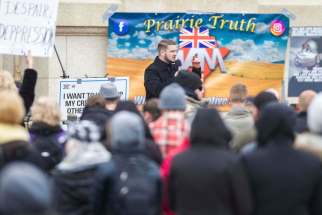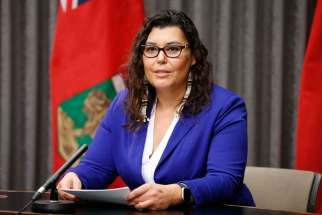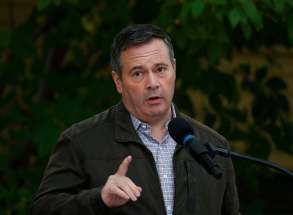All Indigenous adults in Manitoba eligible for vaccination Announcement sparks mix of relief, concern
Read this article for free:
or
Already have an account? Log in here »
To continue reading, please subscribe:
Monthly Digital Subscription
$0 for the first 4 weeks*
- Enjoy unlimited reading on winnipegfreepress.com
- Read the E-Edition, our digital replica newspaper
- Access News Break, our award-winning app
- Play interactive puzzles
*No charge for 4 weeks then price increases to the regular rate of $19.00 plus GST every four weeks. Offer available to new and qualified returning subscribers only. Cancel any time.
Monthly Digital Subscription
$4.75/week*
- Enjoy unlimited reading on winnipegfreepress.com
- Read the E-Edition, our digital replica newspaper
- Access News Break, our award-winning app
- Play interactive puzzles
*Billed as $19 plus GST every four weeks. Cancel any time.
To continue reading, please subscribe:
Add Free Press access to your Brandon Sun subscription for only an additional
$1 for the first 4 weeks*
*Your next subscription payment will increase by $1.00 and you will be charged $16.99 plus GST for four weeks. After four weeks, your payment will increase to $23.99 plus GST every four weeks.
Read unlimited articles for free today:
or
Already have an account? Log in here »
Hey there, time traveller!
This article was published 03/05/2021 (1686 days ago), so information in it may no longer be current.
Any Manitoba adult who says they’re First Nations, Métis or Inuit can now get a COVID-19 vaccine, a move that provoked a mix of relief and apprehension among Indigenous groups.
“People who self-identify as First Nations, Métis or Inuit will be able to access the vaccine, without needing to provide any type of proof,” Dr. Marcia Anderson, public health lead for the First Nations Pandemic Response Co-ordination Team, said Monday.
The province had previously offered shots to people in Indigenous communities, as well as all adults in priority neighbourhoods where many Indigenous people reside, to reach elders and the most vulnerable.
Now, anyone over the age of 18 who identifies as First Nations, Métis and Inuit can get shots at super-sites, without being asked to prove they’re Indigenous.
“This announcement today will close the gap, by making all Indigenous people eligible,” Anderson told reporters.
The Manitoba Metis Federation said it learned of the news less than an hour before a media briefing Monday.
“Today surprised us; it’s out of the blue,” said MMF President David Chartrand.
He fears people lying about being Indigenous to get a shot will put elderly, disabled and poor Métis people farther back in the line.
“This announcement today will close the gap, by making all Indigenous people eligible.”
– Dr. Marcia Anderson
“We’re very concerned that anybody off the street can say, ‘Well, I need this vaccine and I don’t have chronic health conditions, but if I say I’m Métis I can get it anyway,’” Chartrand said.
“Sometimes you ask yourself, are they really thinking out the process, or are they just reacting.”
The head of the Manitoba Inuit Association praised the change, which she said the province informed her of over the weekend.
“This is great news,” said Rachel Dutton.
The Inuit association has held its own vaccine clinic as part of the provincial rollout, for Inuit and their family members who met provincial criteria. Verifying if someone is Inuit wasn’t an issue, she said.

“The history of self-declaration for Inuit is very different from the history and lived experience of Métis,” said Dutton.
Anderson said all Indigenous people have been impacted by colonization, and suffer more of the chronic conditions that leave them at a high risk for severe COVID-19 outcomes.
Meanwhile, most of the 52,000 vaccine doses that have been administered to First Nations people in Manitoba (75 per cent) have been on reserves.
Yet increasing numbers of First Nations people living off-reserve are being hospitalized and dying from COVID-19, leading the province to expand eligibility and set up pop-up sites to get more people vaccinated.
“We’re very concerned that anybody off the street can say, ‘Well, I need this vaccine and I don’t have chronic health conditions, but if I say I’m Métis I can get it anyway.”
– MMF President David Chartrand
“We have seen consistently that First Nations people have made up 50 to 60 per cent of all COVID-19 admissions to intensive-care units, and we want to ensure that all Indigenous peoples in Manitoba can access the vaccine as soon as possible,” Anderson said.
“Getting the vaccine will not only protect the person, but also their family members and loved ones, which is critical to saving lives and protecting the capacity of the health-care system.”
The province had already offered shots to all adults in priority neighbourhoods of Winnipeg, Brandon and other parts of the province with high coronavirus spread.
“We are trying to make it as easy as possible for as many people as possible to get vaccinated quickly,” said Dr. Joss Reimer, the medical lead for Manitoba’s vaccine rollout.
.jpg?w=1000)
Part of that involves vaccine clinics led by groups like Ma Mawi Wi Chi Itata Centre, which received an unexpected allotment of Moderna doses from the province for walk-ins Monday. Dozens queued up outside the centre on McGregor Street, with 720 shots administered by end of the day.
Starting Tuesday, the plan is to administer 360 doses a day, 80 per cent of which should be scheduled appointments, said spokeswoman Rosalyn Boucha.
The Mawi Wi pop-up is among the vaccination sites meant for all Indigenous people, yet Chartrand said Métis don’t use those services as often as ones offered by the MMF.
He said the MMF was trying to get data from the province on how many of its registered 40,000 citizens have been vaccinated, so it could try setting up clinics in areas with large Métis populations.
Chartrand said the last discussion, on April 23, made no mention of opening up availability to anybody identifying as Indigenous.
“We are trying to make it as easy as possible for as many people as possible to get vaccinated quickly.”
– Dr. Joss Reimer
“It’s very insulting to me,” said Chartrand. He’d prefer the province require an MMF citizenship card or a letter authorizing someone as being Métis, which could include 125,000 people.
Back in February, Anderson warned there would be a mechanism to weed out people who falsely identify as First Nations, or claim distant, tenuous family connections to get a shot.
“Fortunately, over time, what we’ve seen is that’s become less necessary,” Anderson said Monday.
Reimer also said she expects that vaccine eligibility criteria will be further expanded Tuesday to include more priority communities and, later this week, to include more Manitoba adults.
Eligibility for the AstraZeneca vaccine, which is provided at medical clinics and pharmacies, will remain for people 40 and over, or people age 30 to 39 with certain high-priority medical conditions.
— with files from Carol Sanders
dylan.robertson@freepress.mb.ca
History
Updated on Monday, May 3, 2021 5:42 PM CDT: updates story to final version
Updated on Monday, May 3, 2021 6:07 PM CDT: Adds photos, pullquotes.
Updated on Tuesday, May 4, 2021 11:09 AM CDT: Changes "to include more Manitoba adults" from "to include all Manitoba adults"









